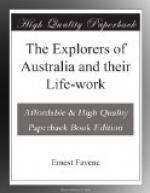Stuart Russell, in his Genesis of Queensland, cites his shrewd old stockman’s opinion of Dr. Leichhardt, as he was just before his first trip. The station from which Leichhardt started on that occasion was near Russell’s, so that the man spoke from personal knowledge: “It’s my belief that if Dr. Leichhardt do it at all, ’twill be more by good luck than management. Why, sir, he hasn’t got the knack of some of us; why it comes like mother’s milk to some. I can’t tell how or why, but it does. Mark my words, sir, Dr. Leichhardt hasn’t got it in him, and never will have.”
Two invaluable qualities in an explorer, apart from his scientific attainments, Leichhardt possessed. These were courage and determination; necessary no doubt, but not sufficient in themselves to carry through an expedition to success. He lacked tact, and was deficient in practical knowledge of the bush, and especially in what is known as bushmanship. One fixed idea of his was, that in dry country if one can only keep on far enough one is bound to come to water: a theory plausible enough if it could be carried out to its logical conclusion; but the application of which often involves a physical impossibility. And it must be taken into consideration that Leichhardt had never travelled in the dry country of the interior, but that what small experience he possessed had been gained on the fairly well-watered coast. He asserts in his journal that cattle and horses trust entirely to the sense of vision for finding water, and not to the sense of smell. The exact reverse is of course the case.
The character of the lost explorer will thus be seen to have militated strongly against his success when he came to be pitted against the — to him — unknown dangers of a dry season in the far interior. But his fatal self-confidence led him to challenge the desert, thinking that he must succeed where better men had been denied even the hope of success. When his last expedition comes to be reviewed, a more detailed discussion of the probabilities of a successful issue to it will be made. Poor Leichhardt, with all his moods and caprices, it would have been strange if he had not shown some appreciation of humour. Let us quote his description of his sudden and unexpected arrival in Sydney, after the Port Essington expedition.
“We did come to Sydney, it was quite dark; we did go ashore, and then I thought to see my dear friend Lynd. So I went up George Street to the barracks. And then I went to his quarters to his window. He was dressing himself; I did put in my head; he did jump out of the other window and I stood there wondering. Soon many people did come round, and did look, Oh so timid. I did not know all. And there was such a greeting. I was dead, and was alive again. I was lost, and was found.”
But in thus reviewing Leichhardt’s aptitude — or rather inaptitude — for the work, and commenting upon his shortcomings, we must do him the fullest justice by paying homage to the sincerity of his belief in himself and his mission. In that belief he was honestly loyal. His conception of his duty was of the highest, and in its interest he would, and did, make every sacrifice in his power. If some prescient tongue could have told Leichhardt that the end of his quest would be an unknown death, he would have accepted the fate without a murmur, provided his death benefited geographical discovery.




